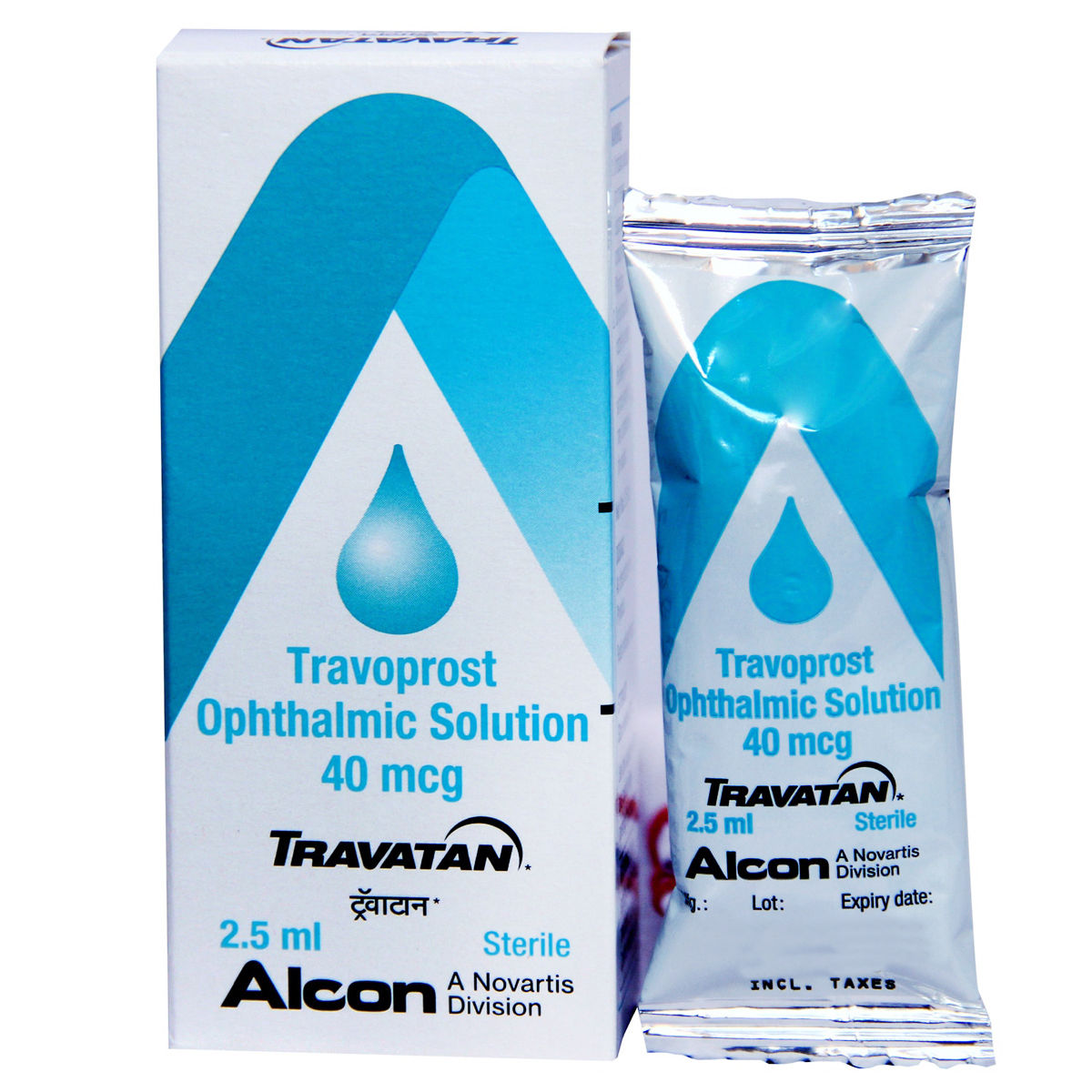Travoprost
About Travoprost
Travoprost belongs to the class of ophthalmic preparations. It is used for the reduction of elevated intraocular pressure in patients with open-angle glaucoma or ocular hypertension. Glaucoma is an eye condition that causes damage to the optic nerve (necessary for optimal vision) as a result of unusual high eye pressure. Ocular hypertension is an increase in ocular pressure caused by inadequate aqueous humor outflow (fluid in the eye that maintains normal pressure by its continuous flow).
Travoprost contains Travoprost, a prostaglandin analogue that reduces elevated ocular pressure by enhancing the outflow of aqueous fluid.
Travoprost should be used as prescribed by your doctor. Conjunctival hyperemia (a sign of acute anterior inflammation), decreased visual acuity, eye discomfort, foreign body sensation, pain and pruritus (itching) may occur in some situations. The majority of side effects do not require medical treatment and fade away with time. However, if the side effects persist, consult your doctor.
If you are allergic to Travoprost or any ingredients present in the Travoprost, inform the doctor. It is recommended not to take Travoprost if you are a pregnant or nursing mother without first consulting your doctor. If you are using more than one ophthalmic medicine, give each one (drug) at least a ten-minute gap. Travoprost may induce temporary blurred vision; therefore, avoid driving or operating machinery until your vision is clear. Before using the Travoprost, inform your doctor about your medical history and other medications you are currently taking to rule out any potential negative effects.
Uses of Travoprost
Medicinal Benefits
The intraocular pressure (the pressure built inside the eyeball) is naturally maintained by a normally flowing liquid known as aqueous humour. If this outflow of liquid gets blocked, then aqueous pressure starts putting more pressure within the eyeball. Excessive pressure must be managed; otherwise, it can damage the optic nerve and impair vision. Travoprost is a well-known medication for open-angle glaucoma that effectively reduces excessive pressure by inhibiting prostaglandin action in the eye. Prostaglandin is a naturally occurring chemical that contributes to eye dryness. Travoprost functions as a synthetic prostaglandin that works similarly to natural ones by increasing the drainage of aqueous humour inside the eyeball, resulting in a decrease in intraocular pressure.
Directions for Use
Storage
Side Effects of Travoprost
Conjunctival hyperemia (sign of acute anterior inflammation)
Decreased visual acuity
Eye discomfort
Foreign body sensation
Pain
Pruritus (itching)
Drug Warnings
Go for regular eye checkups that help the doctor know whether Travoprost is working properly or not. Apply the Travoprost in the affected eye as directed by the doctor, and don't increase the dose or use it more often to get the results faster. Always remove the contact lenses before using Travoprost as there is a preservative in Travoprost that can be absorbed by the contact lenses. It is better one should wait for a minimum of 15 minutes after applying this drug before putting lenses back in. Do not rinse and use the dropper; instead, replace the dropper after every use. Don't skip a dose, and use it regularly to gain maximum benefits. Try to use this medication at the same time of day. Keep using this drug even if you feel better and ask your doctor they will tell you the right time to stop it.
Drug Interactions
Drug-Drug Interactions: Travoprost may interact with various medications such as bimatoprost ophthalmic, bimatoprost topical, latanoprost ophthalmic, latanoprostene ophthalmic, tafluprost ophthalmic, unoprostone ophthalmic.
Drug-Food Interactions: No interactions reported. However, one should limit alcohol and caffeine consumption, as these foods are responsible for increased intraocular pressure.
Drug-Disease Interactions: Travoprost may interact with disease conditions, including macular oedema (build-up of fluid in the macula, an area in the centre of the retina.), uveitis (a form of eye inflammation), and renal/liver disease.
Drug-Drug Interactions Checker List:
Safety Advice

Alcohol
cautionNo interaction was found. However, it is advisable not to take or limit alcohol as a precautionary measure.

Pregnancy
cautionTravoprost is a synthetic prostaglandin that is biologically active and gets absorbed through the skin. Hence Travoprost could be used in pregnancy only under medical supervision if clearly needed.

Breast Feeding
safe if prescribedTravoprost should be used with caution in breastfeeding women. If you are a breastfeeding mother your doctor will weigh the benefits and potential risks before prescribing Travoprost for you.

Driving
cautionTravoprost may cause temporary blurred vision. Therefore, avoid driving or doing activities that require clear vision.

Liver
safe if prescribedTravoprost is safe to use in patients with Liver diseases/conditions if prescribed by a doctor.

Kidney
safe if prescribedTravoprost is safe to use in patients with kidney diseases/conditions if prescribed by a doctor.

Children
unsafeIt is not recommended for use in children under 16 years of age.
Habit Forming
Diet & Lifestyle Advise
Blackcurrants are rich in anthocyanins that help normalize the flow of blood in the eyes.
- Include dairy foods in your diet that may improve eye health.
- Indulge yourself in aerobic exercise that relaxes eye muscles and the pressure built inside them.
- Consume more leafy vegetables, including cabbage, kale, and spinach, that improves eye health and lowers the risk of glaucoma.
- Quit smoking as it increases the risk of open-angle glaucoma.
- Avoid the consumption of too much caffeine and alcohol as these products affect eye health and, at one point, increase eye pressure.
- If you wear contact lenses, clean and replace them more frequently. Never share your contact lenses. Always cleanse your hands before putting on the contact lens.
- Wipe your eyes and face with clean towels or tissues at all times.
- Maintain good hygiene to keep your eyes clean and clear of irritants.
- Do not rub your eyes.
- Avoid looking at digital screens for extended periods of time.
- Wash your hands thoroughly, and do not touch the dropper before using drops to avoid contamination.
Patients Concern
Disease/Condition Glossary
Ocular hypertension: Ocular hypertension occurs when the pressure inside the eye (intraocular pressure or IOP) is higher than normal. Ocular hypertension is typically caused by a blockage in the eye's drainage ducts or an excess of aqueous humour.
Glaucoma: Glaucoma is an eye condition that occurs when the optic nerve, which connects the eye to the brain, is injured. It is usually caused by a build-up of fluid in the front of the eye, which raises the pressure inside the eye. Glaucoma can cause vision loss if it is not detected and treated early. Early detection and treatment can help keep your vision from deteriorating.
FAQs
Travoprost is used to reduce elevated intraocular pressure in patients with open-angle glaucoma or ocular hypertension.
Travoprost contains Travoprost, a prostaglandin analogue that reduces elevated ocular pressure by enhancing the outflow of aqueous fluid.
Yes, there are possible chances one may face slight redness in their eyes after using this drug. However, this redness will settle down within some time. You should seek medical attention if you notice any redness, swelling, or any other side effects associated with this drug.
If a person is using other ophthalmic medications, then they should keep a gap of at least 5 minutes between each medicine.
Travoprost needs to be used before sleeping, whether a person is sleeping at night or day, as this drug may cause temporary blurred vision. So, a person should rest properly after applying it to get maximum benefits.
A person undergoing an eye examination should tell their doctor about all of their allergies, medical history, drug history, and any herbal medicine they are using. The use of Travoprost is restricted in patients having an allergy to any of its constituents.
Remove your contact lenses before using Travoprost as this drug may contain some types of preservatives that can discolour the soft contact lenses. You should need to wait for a minimum of 15 minutes after using this medicine before putting the lenses back.
Yes, Travoprost may cause dry eyes as a common side effect. It is not necessary for everyone taking Travoprost to experience this side effect. However, if dryness or irritation persists or worsens, please consult your doctor.
Yes, Travoprost may change eyelashes gradually. It may increase the length, thickness, colour and/or number of eyelashes.
Travoprost starts working after about 2 hours of administration and the maximum effect is reached after 12 hours. However, if your symptoms do not improve in a day, please consult your doctor.
Travoprost should always be used as advised by the doctor. Usually, the recommended dose is one drop in the affected eye/eyes, once a day, in the evening. Use Travoprost in both the eyes only if your doctor has told you to do so.
Store Travoprost below 30°C. Protect from light and moisture. Do not freeze. Keep it out of sight and reach of children. Before opening, keep the bottle in carton in order to protect from moisture.
No, do not stop using Travoprost without first consulting your doctor. If you discontinue suddenly, the pressure in the eyes may not be controlled which could lead to loss of sight. Therefore, use Travoprost for as long as your doctor has prescribed it, and if you experience any difficulty while using Travoprost, please consult your doctor.
You should consult your doctor immediately if you get an eye infection, eyelid reaction or conjunctivitis. Also, let your doctor know if you have an eye surgery or eye injury. Talk to your doctor whether you need to keep using Travoprost.







